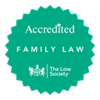Safeguarding Vulnerable Adults
If you have full or partial responsibility for a relative suffering from dementia, learning disability, or mental disorder then sometimes that responsibility weighs heavily. There are difficult decisions to be made about keeping your loved one physically well and healthy but ensuring they have a good quality of life.
How to protect a vulnerable adult
People who lack capacity to make decisions about what is in their best interests need extra protection. The Mental Capacity Act 2005 was introduced to ensure that people who lack mental capacity to make their own decision, or their relatives could challenge decisions made by the local authority, hospital or care homes.
However, there are still many relatives who do not know that they can challenge decisions made by care homes or hospitals, how to go about doing so or that they can have a say in care plans.
Often children want the best for their parents but feel the answer is to protect them from physical harm whilst maybe not recognising that their elderly parent would prefer to take the risk of falling in their own home than living a safer but sterile life in a care home.
Local authorities and relatives do not always get the balance right. Resources are stretched, easy options are taken and our Safeguarding Adults department can advise you of your rights and the process of challenging decisions or assist you in negotiating a better care plan for your relative.
So what can you do if disagree with a decision regarding a relative?
If the managing authority thinks they need to deprive your relative of their liberty they must write to the Primary Care Trust for the hospital or the Local Authority for Care Homes (“supervisory body”) to tell them.
Care homes and hospitals must adhere to a code of practise for the Deprivation of Liberty Safeguards (“DoLS”). At least two assessors need to check how your relative is being treated or cared for. One of these is called the Best Interests Assessor who will write a report. The Best Interests Assessor is a key role within the process and must seek the views of all appropriate people.
The safeguard should be for as short a time as possible and never for longer than a year. The report may say the deprivation of liberty is in your relative’s best interests, or may say changes are needed to the care plan, or that your relative should not be deprived of their liberty.
If authorisation to deprive them of liberty is given, your relative must have a representative who can be a member of the family or a friend. Anyone unhappy about the deprivation of liberty can ask for a review. If still unhappy an application can be made to the Court of Protection.
How we can help safeguard a vulnerable adult
If you feel that you or your vulnerable relative may have been deprived of their liberty without the necessary safeguarding process or if you feel that the care plan provided for them is not in their best interests then please contact us. We offer an initial fixed fee meeting that will enable you to explore your options with us.
Get in touch by calling 0330 0945 500, emailing info@nevesllp.co.uk or completing our Contact Form and we'll get back to you.
















